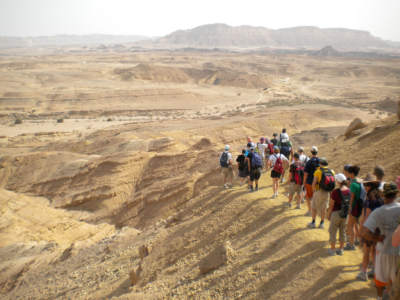I grew up hungry for Jewishness. As a young American Jew eager to explore my family’s culture, I tried countless times to find a rabbi or a Hillel staffer who could connect me to our rich history. Everyone gave me the same answer: go on Birthright.
One friend, the daughter of a Palestinian refugee, saw the flyer and asked me about Birthright.
“It’s a free vacation,” I shrugged. “And I really want to learn more about Judaism and my culture. Haven’t you ever gone back to Palestine?”
She looked startled, confused as to how someone could even ask such a question. “I can’t go back,” she told me. “My family is from Gaza.”
I was floored. Not only was I shocked at the injustice of Palestinians and their descendents being barred from returning home, I was also appalled that I had never realized this before. The flyer in my hand claimed that a free vacation, on the bulldozed homes of families like my friend’s, was my birthright. I couldn’t understand why no one – not the rabbis, not the Hillel staffers, not the Birthright ads – had been honest with me.
Birthright Israel recently announced changes to their programming. Birthright will soon discontinue meetings between program participants and Israeli Arabs, Palestinian citizens of Israel, which they began incorporating into their free Israel trips two years ago.
This isn’t a neutral trip to see a new country. It’s a government’s political project. And we, young American Jews, are on the agenda.
Birthright trips are marketed as opportunities for young American Jews to explore Judaism on our own terms. Many of us have seen advertisements for trips designed to appeal to our unique interests and identities – outdoors trips, spiritual trips, and LGBTQ trips abound.
But the parameters and goals of the trip are set by the funders and stakeholders, like far-right American billionaire Sheldon Adelson and the Israeli government. While they may not determine Birthright’s itineraries, donors have a stated agenda of tying Jewish identity to Israel, enlisting young Jews in defense of the government’s unjust policies. The Israeli government and its American Jewish backers know that, historically, securing American Jewish support for Israeli occupation and discrimination requires an aggressive propaganda strategy. They have found one for the next generation of American Jews in Birthright.
Birthright strategically employs bonding peer meet-ups and adventures to connect Americans and Israelis, or rather, certain Israelis. The Mifgash, or “encounter,” a central component of most Birthright trips, introduces Birthright-goers to Israel Defense Forces soldiers and encourages them to forge friendships with each other through social events and outdoors activities. Birthright donors in Israel and the U.S. hope that funding beach parties for American Jews and IDF soldiers will endear the Israeli military to the next generation of American Jewry, even as the occupation drags on and Israel’s human rights violations continue to mount.
At least until now, Birthright had a program which included meet-ups with Israeli Arabs. Granted, these encounters allowed Birthright to hide Israel’s policies behind a facade of diversity and distract young Americans from the exile and occupation of the Palestinian majority. Nonetheless, when young Jews met Palestinians on Birthright trips, Birthright risked them hearing critical perspectives that could cause them to question, not only the propaganda they hear on the rest of the trip, but the underlying reasons for the trip itself. This new exclusion of the Palestinian perspective is a clear confirmation that Birthright isn’t interested in portraying Israel honestly but maintaining the status quo.
This decision ultimately betrays a deep anxiety held by Birthright’s supporters – that young Jews, if exposed to nuance, would pose a great threat to Israel’s current policies. Birthright does not want young Jews to critically engage with Israel and its realities. Birthright’s Israel is an Israel of outdoor adventures and wild parties, devoid of Palestinians. They want us to take selfies on top of a camel and not ask questions. Birthright’s backers know that the inclusion of even a few Palestinian voices could expose Birthright’s work for what it is, propaganda. So, they cut them out. But we, young Jewish Americans, have voices, too, voices we can use to challenge the lies we are fed about Birthright’s Israel.
This “free” vacation has a price – and that expense is paid with the silence of Palestinians. I return the Birthright. Will you?
Elaine Cleary is a senior at Ohio State University studying economics and political science.
![birthright | By Quazie [CC BY 2.0], via Creative Commons](https://newvoices.org/wp-content/uploads/2017/11/birthright.jpg)

